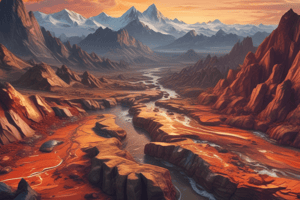Podcast
Questions and Answers
What is a common cause for earthquakes, according to the text?
What is a common cause for earthquakes, according to the text?
- Collision or movement of tectonic plates (correct)
- Meteorite impacts on the Earth's surface
- Strong winds blowing across continents
- Excessive mining activities
How are tsunamis related to earthquakes?
How are tsunamis related to earthquakes?
- Tsunamis are caused by volcanic eruptions
- Tsunamis occur randomly and are not connected to earthquakes
- Tsunamis are purely meteorological phenomena
- Tsunamis are caused by sudden displacement in the sea floor during earthquakes (correct)
What do seismographs measure to detect earthquakes?
What do seismographs measure to detect earthquakes?
- Atmospheric pressure changes
- Tiny vibrations in the earth's crust caused by earthquakes (correct)
- Solar radiation levels
- Bird migration patterns
How do scientists define an earthquake?
How do scientists define an earthquake?
What can lead to stress building up between tectonic plates?
What can lead to stress building up between tectonic plates?
How do satellites assist scientists after an earthquake?
How do satellites assist scientists after an earthquake?
Flashcards are hidden until you start studying
Study Notes
Natural phenomena come in many forms, one notable example being earthquakes. These are seismic events resulting from the movement of tectonic plates within Earth's lithosphere. An earthquake is defined by the USGS as "a natural event where the earth shakes due to the rapid release of energy". Here are some key points about this phenomenon:
Causes: A common cause for an earthquake is when two tectonic plates collide with each other or move past one another. This can lead to stress building up along their edges until it becomes too much and causes an earthquake. Another possible reason could be if magma moves beneath and weakens the surface rocks above during volcanic eruptions.
Effects: When the ground starts shaking uncontrollably, it is likely because there has been a significant amount of energy released quickly under the surface of the earth. This may result in damage such as cracks and broken structures like roads or buildings. In more severe cases it can even trigger tsunamis, which are large ocean waves created by sudden displacement in the sea floor caused by an earthquake.
Detection: Scientists have developed ways to detect these movements using seismographs. Seismographs work by measuring tiny vibrations in the earth caused by earthquakes, so they can give scientists a good idea how big an earthquake is and what parts of the world it's happening in. Additionally, satellite technology helps scientists track changes in the shape of the earth after an earthquake.
Eruption Prediction: While predicting exactly where or when an earthquake will happen is difficult, scientists still make educated guesses based on information that comes from studying previous quakes. By tracking movements of nearby landmasses over time, researchers build models showing probable locations for future tremors.
In summary, earthquakes are a type of natural phenomenon brought about by shifting tectonic plates deep underground. They can be detected through instruments called seismographs and are predicted primarily through extrapolating patterns seen in historical data related to similar occurrences elsewhere on our planet.
Studying That Suits You
Use AI to generate personalized quizzes and flashcards to suit your learning preferences.




